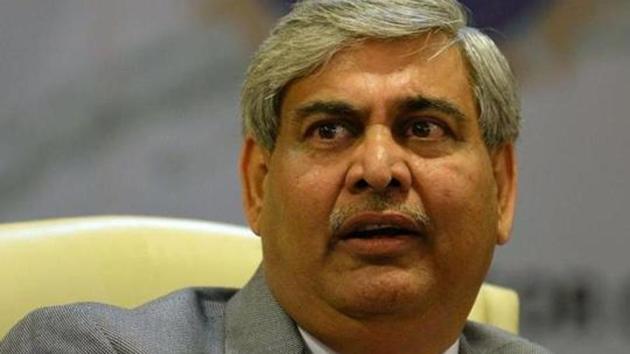Manohar steps down as ICC Chairman a week early
Although Deputy chairman Imran Khwaja, formerly of Singapore Cricket Association, will be the interim head, the new chairman is likely to be a candidate backed by the BCCI, or even from the richest national cricket board.
India’s Shashank Manohar stepped down as International Cricket Council (ICC) chairman on Wednesday, one week before the election process for his successor is announced. Deputy chairman Imran Khwaja, formerly of Singapore Cricket Association, will be the interim head.

The new chairman is likely to be a candidate backed by the Indian board (BCCI), or even from the richest national cricket board. Equations in world cricket suggest it is unlikely to be anyone backed by the outgoing chairman.
Also Read | Had to hide my wife in the cupboard of my hotel room in 99 WC: Saqlain
Manohar, a former BCCI president, had announced in December he won’t seek a third two-year term. Top BCCI officials have been critical of Manohar, for ‘moving away’ when the ‘tide is against him’. “Last October, BCCI elected new office-bearers and they had begun to make friends in other member boards against him,” says an ex-BCCI administrator.
Manohar though had in his two stints made many friends in the ICC boardroom. He was appointed the first independent ICC chairman in May 2016—a reform he had championed in the global body. He got the post by virtue of being the Indian board’s nominee to ICC. To meet the ‘independent’ criteria, he quit as BCCI president, then gave up ICC chairmanship and was immediately re-elected.
BCCI had initially called his election ‘a matter of pride for India’. But the sentiment changed as he opposed the Big Three model introduced under N Srinivasan’s ICC tenure that benefited the big three - India, Australia and England the most; BCCI promised a major chunk of ICC’s revenue pie– $570 million (2015-23).
Under Manohar, ICC board abolished the formula and brought in a more equitable revenue distribution model. BCCI lost its seat in the crucial ICC Finance and Commercial Affairs Committee. Its influence in ICC was further eroded as Manohar revamped the constitution, adding three associates and the two Test newcomers—Afghanistan and Ireland—to the board.
Manohar found the support for a second term in 2018 as BCCI’s influence had waned amid an internal power struggle between Court-appointed administrators and office-bearers. India’s revenue share slipped to $293 million, and although pegged at $405 million after negotiations, it is expected to fall short of that.
Indian board officials argue that other boards have not really benefitted under Manohar.
Afghanistan and Ireland have played only four and three Tests since entering the Test-fold in 2018 and Test teams other than the Big Three are struggling to find rights holders to finance bilateral cricket.
With world cricket hit by cancellations due to Covid-19, the World Test Championship in doubt and the Australia T20 World Cup in October-November facing a possible postponement, the new chairman will face a stiff challenge.
BCCI president Sourav Ganguly may contest though England board (ECB) chairman Colin Graves is the frontrunner.






